Table of ContentsClose
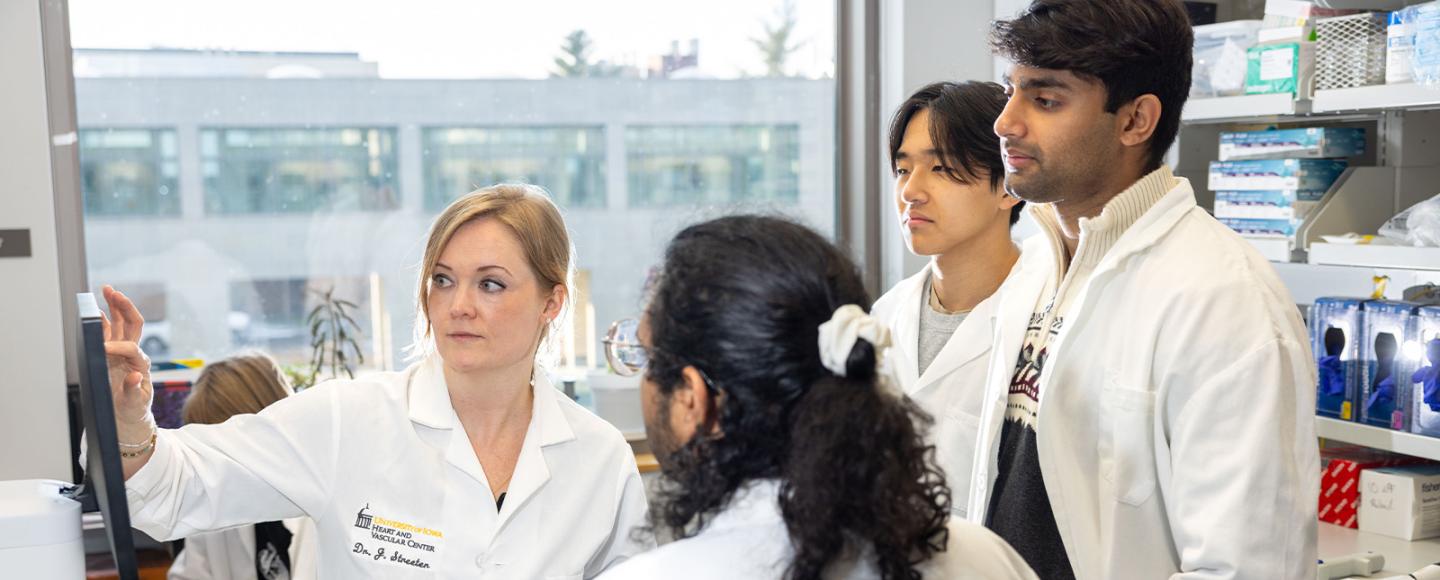
Leading advances in heart disease and stroke
The Abboud Cardiovascular Research Center marks 50 years of collaboration, training, and mentorship.
Jennifer Streeter is a quintessential cardiovascular researcher, clinician, and teacher.
In her lab, Streeter (15MD/PhD, 17R, 21F) and her team are developing new approaches to diagnosing and treating atherosclerosis, which is the buildup of plaque in the arteries that restricts blood flow and can lead to coronary heart disease or stroke. Using single-stranded molecules known as aptamers, they’re creating and testing new contrast agents used in coronary angiography to visualize the arteries that supply blood to the heart. The team is also studying gene expression of atherosclerotic plaques to identify potentially new targets for plaque-resolving therapies.
How sex and gender influence cardiovascular disease and treatment is another area of focus in the Streeter lab. By examining sex-dependent differences in clinical outcomes, the team aims to identify sex-specific genetic markers of heart disease.
Streeter also established the Iowa Living Human Heart Research Program, an initiative that provides living human cardiac tissue for studies by UI investigators. Incorporating tissue from the explanted hearts of transplant patients can help bridge the gap between experimental models and real human biology—improving the translatability of findings and advancing precision medicine. Iowa is one of a small number of research institutions in the world using patient-derived living human heart tissue.
“It’s a resource we treat with the utmost respect,” she says, “and one that underscores the human impact of everything we do.”
As a clinician, Streeter performs diagnostic catheterizations and aortic stenosis assessments in the cardiac catheterization lab. As a member of the cardiology consult service, she works with cardiology fellows, residents, medical students, physician assistants, and nurse practitioners on managing heart-related conditions for patients in non-cardiology units. She also teaches students, trainees,
and non-physician providers how to improve their skills in reading and interpreting EKGs (electrocardiograms) that record the heart’s electrical activity.
An MD/PhD graduate of the Carver College of Medicine’s Medical Scientist Training Program (MSTP), Streeter advises and mentors current MSTP students. She also serves on the MSTP Grand Rounds committee, helping students develop and deliver scientific presentations that bridge clinical and laboratory expertise. Fostering students’ growth as effective communicators is a “vital skill for physician-scientists,” she says.
In many ways, Streeter epitomizes the overarching goal of the François M. Abboud Cardiovascular Research Center (ACRC): to advance understanding and treatment of heart disease and stroke through collaboration, training, and mentorship.
Based in the Department of Internal Medicine and its cardiovascular medicine division, the center’s roster includes more than 200 investigators from the Carver College of Medicine as well as the UI Colleges of Pharmacy, Public Health, and Liberal Arts and Sciences.
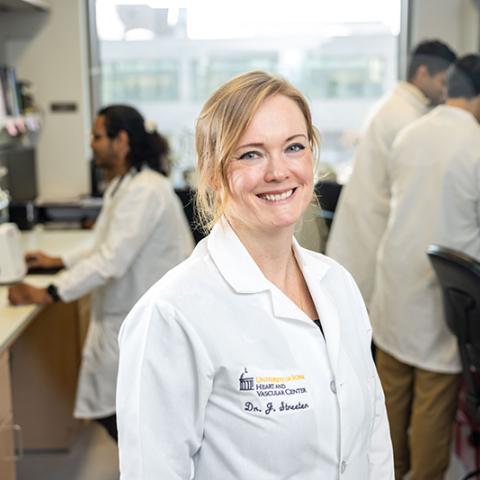
Jennifer Streeter, MD, PhD
Assistant professor, Department of Internal Medicine
"[Living patient-derived heart tissue] is a resource we treat with the utmost respect and one that underscores the human impact of everything we do."
Advancing cardiovascular research for a half-century
October 2024 marked the 50th anniversary of the ACRC. When it was established in 1974 through a five-year, $25 million grant from the National Institutes of Health (NIH), it was the first major multidisciplinary research initiative at Iowa. One component of the new center was an NIH Institutional Research Fellowship Training Grant, which received continual NIH grant renewal funding through 2023.
François Abboud, MD (61R), who in the early 1970s served as director of the cardiology division in the Department of Internal Medicine—and who would go on to serve as chair of the department from 1976 to 2002—led the effort to establish the center. He envisioned a new paradigm for cardiovascular research at Iowa with a focus on the fundamental mechanisms of heart and vascular disease.
Abboud’s own research focused on autonomic and cardiovascular regulation and has served as a foundational basis for treatments of heart failure and hypertension. In fact, Iowa researchers became nationally recognized leaders in describing how the cardiovascular and nervous systems regulate each other. Other major discoveries identified key molecules and pathways that send electrical and chemical signals in the heart and are associated with hypertension, obesity, atherosclerosis, and heart attack.
In December 2013, the Iowa Board of Regents honored Abboud’s 40 years of Cardiovascular Research Center leadership by naming the center after him.
Two physician-scientists have led the center after Abboud: Mark Anderson, MD, PhD (2012-2014), who also served as chair of the Department of Internal Medicine from 2009-2014, and Barry London, MD, PhD (2015-present). London also is director of the cardiovascular medicine division in the UI Department of Internal Medicine.
“The history of the cardiovascular center has been to be at the forefront of basic science research, both in terms of the types of research that we were doing and in terms of developing physician-scientists and PhD scientists whose focus was predominantly basic research,” London says. “One of the things that we've done over the last decade is to try to broaden that scope. That includes working to develop an outcomes research program—expanding clinical and translational research that's been done—and developing collaborations and supporting projects that are relevant for industry.”
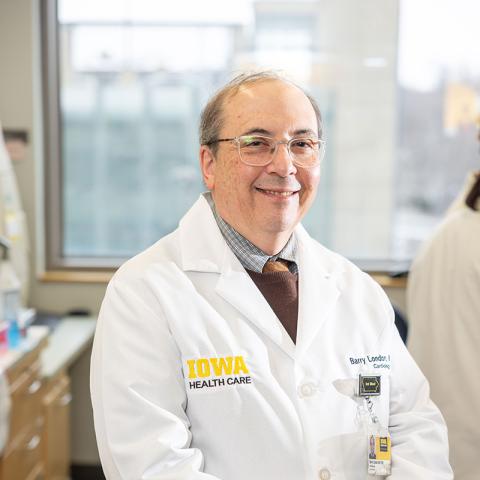
Barry London, MD
Director, Abboud Cardiovascular Research Center
"During its first 50 years, the ACRC has trained over a thousand physicians and scientists and generated more than $500 million of extramural funding. Moving forward, we must continue this work and foster in the future generations the passion and love for investigation that has driven those who were here before us."
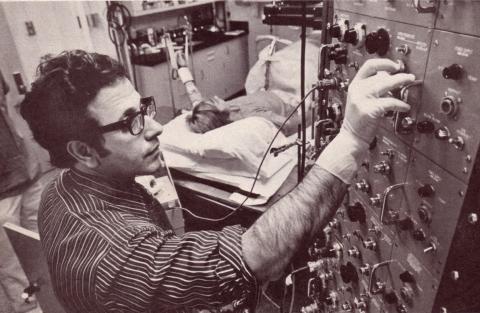
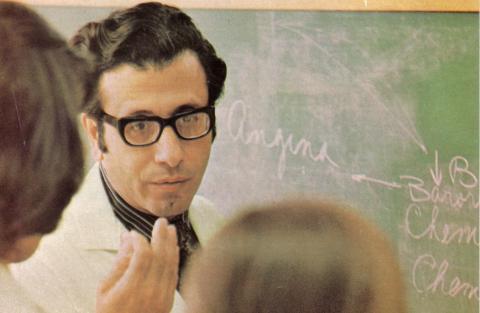
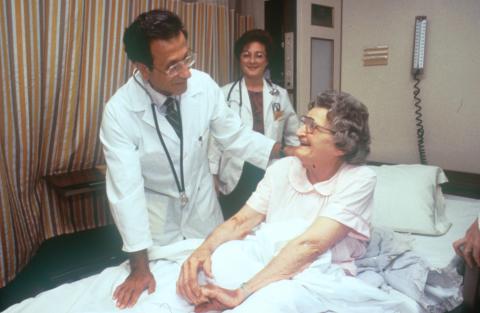
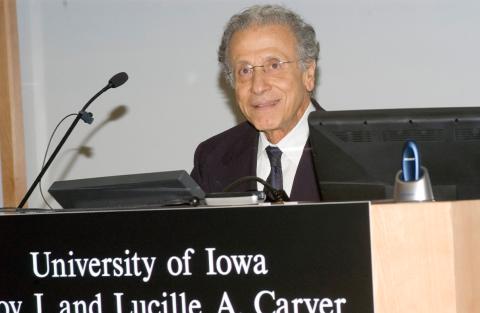
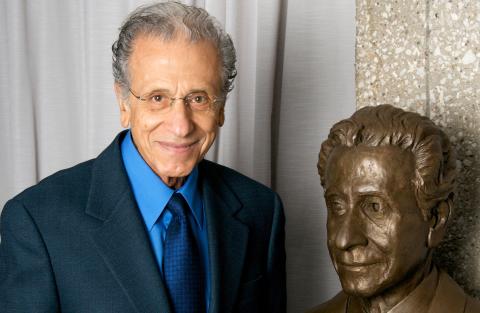
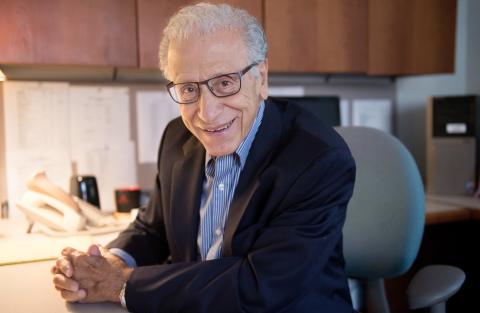
François Abboud’s career at Iowa has spanned more than six decades.
A legacy of discovery and collaboration
François Abboud, MD (61R), is recognized for his research showing that the heart plays a major role as a neurosensory organ—a finding that advanced scientific understanding of autonomic control of circulation. As a result, clinicians became more informed and better equipped to treat conditions such as heart disease, obstructive sleep apnea, and hypertension.
But when Abboud began studying neural control of circulation in the early 1960s, the subject was considered a physiological curiosity with little clinical significance. Abboud’s work changed this and ultimately expanded the field of cardiovascular research.
A few examples: Abboud and his colleagues were the first to prove that insulin activates the nervous system to raise blood pressure when blood sugar levels decrease. Abboud’s team also discovered that salt intake constricts blood vessels in people who are susceptible to high blood pressure. And a study of obstructive sleep apnea led by Abboud was the first to record heightened sympathetic nerve activity and consequent surges in blood pressure in otherwise normal patients whose breathing stopped repeatedly while they were asleep. The study also reported the benefits of CPAP (continuous positive airway pressure) therapy, the primary treatment used today for obstructive sleep apnea.
Abboud is also regarded as a pioneer in forming multidisciplinary teams to study heart disease and related conditions—basic scientists and clinicians from internal medicine, molecular physiology and biophysics, neurology, pulmonology, biochemistry, and pharmacology, for example.
"It's common today,” Abboud said in a 2009 web profile, “but when we started, it was still a unique approach—the idea that if you brought together people with different areas of expertise, you would have a convergence of ideas and a different way of approaching problems that might not be possible if everyone is working separately in his or her own lab.”
Abboud’s National Heart, Lung, and Blood Institute program project grant, funded from 1971 to 2020, was at the time the longest continuously supported grant under the same principal investigator. When it was established at Iowa, it was the first major interdepartmental, intercollegiate research program at the medical school.
A UI faculty member since 1960, Abboud’s impact and commitment to service extended beyond the university. He served as president of the Association of American Physicians, which awarded him the George M. Kober Medal—its highest honor—in 2009. He also served as president of the American Clinical and Climatological Association, the American Federation for Clinical Research, and the American Heart Association, which named him a Distinguished Scientist for 2007. He’s also received major awards from the American College of Cardiology and the Association of American Medical Colleges.
“Frank came to Iowa, stayed in Iowa, poured all his love and energy into Iowa, and championed cardiovascular research—and more broadly, a mechanism of growing it through collaborative efforts,” says Mark Anderson, MD, PhD, a former chair of the UI Department of Internal Medicine and former director of the Abboud Cardiovascular Research Center who now serves as executive vice president for medical affairs and dean of the Pritzker School of Medicine at the University of Chicago.
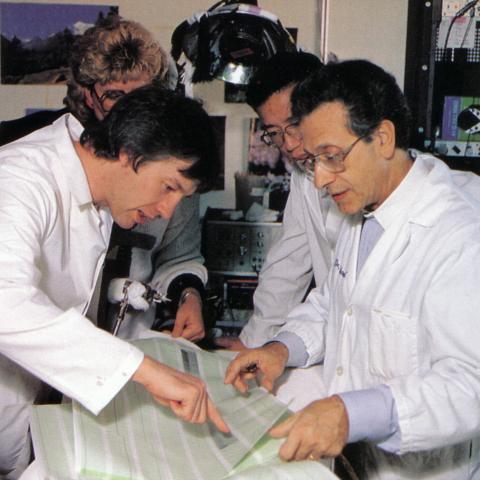
François Abboud
- Professor Emeritus, Department of Internal Medicine–Cardiovascular Medicine, and Department of Molecular Physiology and Biophysics
- The Edith King Pearson Chair of Cardiovascular Research
- Director, Division of Cardiovascular Medicine and Chief of Cardiology, 1970-1976
- Founder and Director, Cardiovascular Research Center, 1974-2012
- Chair, Department of Internal Medicine, 1976-2002
New ablation technology first developed at Iowa
London points to new ablation technology developed by ACRC member Steven Mickelsen, MD (13F, 14F) as one example.
Mickelsen is a professor emeritus in the UI Department of Internal Medicine and CEO of Field Medical Inc., a southern California-based cardiac ablation technology firm he established in 2022. As a member of the ACRC, he founded Farapulse Inc. (originally known as Iowa Approach), in 2012—a UI startup whose pulsed field ablation technology is becoming a new standard of care in the treatment of atrial fibrillation. Pulsed field ablation uses electrical pulses, instead of heat or cold, to selectively ablate cardiac tissue, providing treatment with minimal damage to surrounding tissues. Boston Scientific Corp. acquired Farapulse in June 2021.
Teamwork, training part of center’s mission
Collaboration—across disciplines, across career levels, and across institutions—is imbued in the culture of the ACRC. It’s an approach that Abboud fostered, notes Anderson, who now serves as executive vice president for medical affairs and dean of the University of Chicago’s Pritzker School of Medicine.
“As [Abboud] brought in others like Mike Welsh [74MD, 77R, expertise in cystic fibrosis], Don Heistad [67R, oxidative stress, aortic stenosis], and Kevin Campbell [muscular dystrophy], they developed program grants. This supported the culture of growing this large research program, research in the field, and the cores, enabling the grant that ran for such a long time to support education and training,” Anderson says.
The center’s Institutional Research Fellowship Program, funded through the NIH from 1975 to 2023, provided postgraduate instruction for up to 15 physician-scientists each year. Trainees participated in seminars, graduate courses, bench research, genomic and clinical research, and more, with the primary goal of pursuing an academic career. Over the years, hundreds of cardiovascular scientists have received training through this program.
Looking ahead, moving forward
Embracing new technologies and methodologies that may broaden understanding and treatment of cardiovascular diseases is important for the ACRC to build on its legacy, according to London.
“During its first 50 years, the ACRC has trained over a thousand physicians and scientists and generated more than $500 million of extramural funding,” London says. “Moving forward, we must continue this work and foster in the future generations the passion and love for investigation that has driven those who were here before us. We have some really great young researchers who represent this next generation.”
Researchers like Jennifer Streeter, who describes her experience at Iowa—as a student, resident and fellow, and faculty member—as “empowered.”
“That’s what makes Iowa special. Everyone wants to see you succeed because a win for one person at Iowa is a win for everyone at Iowa,” Streeter says. “The strides we’ve made in cardiovascular disease are just the beginning ... I know the next 50 years will be even more groundbreaking.”
Broad scope of discovery
Over the past five decades, members of the Abboud Cardiovascular Research Center have made significant contributions to the field of cardiovascular medicine. Following are a few examples.
- CARDIOVASCULAR GENETICS: Researchers at the center have made strides in identifying genetic predictors of sudden cardiac death, heart failure, muscular dystrophy, and congenital heart defects, and enhancing diagnostic and therapeutic tools for clinical cardiology.
- CYSTIC FIBROSIS: Landmark research at Iowa on the molecular, biochemical, and functioning defects underlying cystic fibrosis (CF) led to the identification and development of medicines that reverse these defects in people with CF.
- DIABETES AND OBESITY: Investigations into the molecular mechanisms linking hypertension, obesity, and metabolism have led to innovative therapies for cardiovascular diseases associated with these conditions.
- HYPERTENSION RESEARCH: The center employs a variety of molecular, genetic, and physiological approaches to understand and treat this condition.
- INFLAMMATION STUDIES: The center’s research on the cellular and molecular biology of inflammation has provided insights into conditions like heart failure, identifying potential therapeutic targets.
- NEUROLOGICAL AND NEUROVASCULAR RESEARCH: By studying the central nervous system’s control of the heart
and blood vessels, the center has contributed significantly
to the understanding and treatment of heart failure, stroke, and dementia. - CLINICAL TRIALS AND OUTCOMES RESEARCH: Clinical trials focusing on interventional structured cardiology, electrophysiology, pulmonary hypertension, and heart failure complement database studies on diagnostic and therapeutic efficacy performed in the Carver College of Medicine, the College of Public Health, and the Iowa City Veterans Affairs Health Care System.
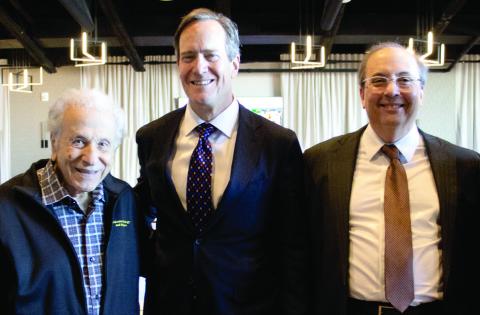
Photos by Liz Martin
